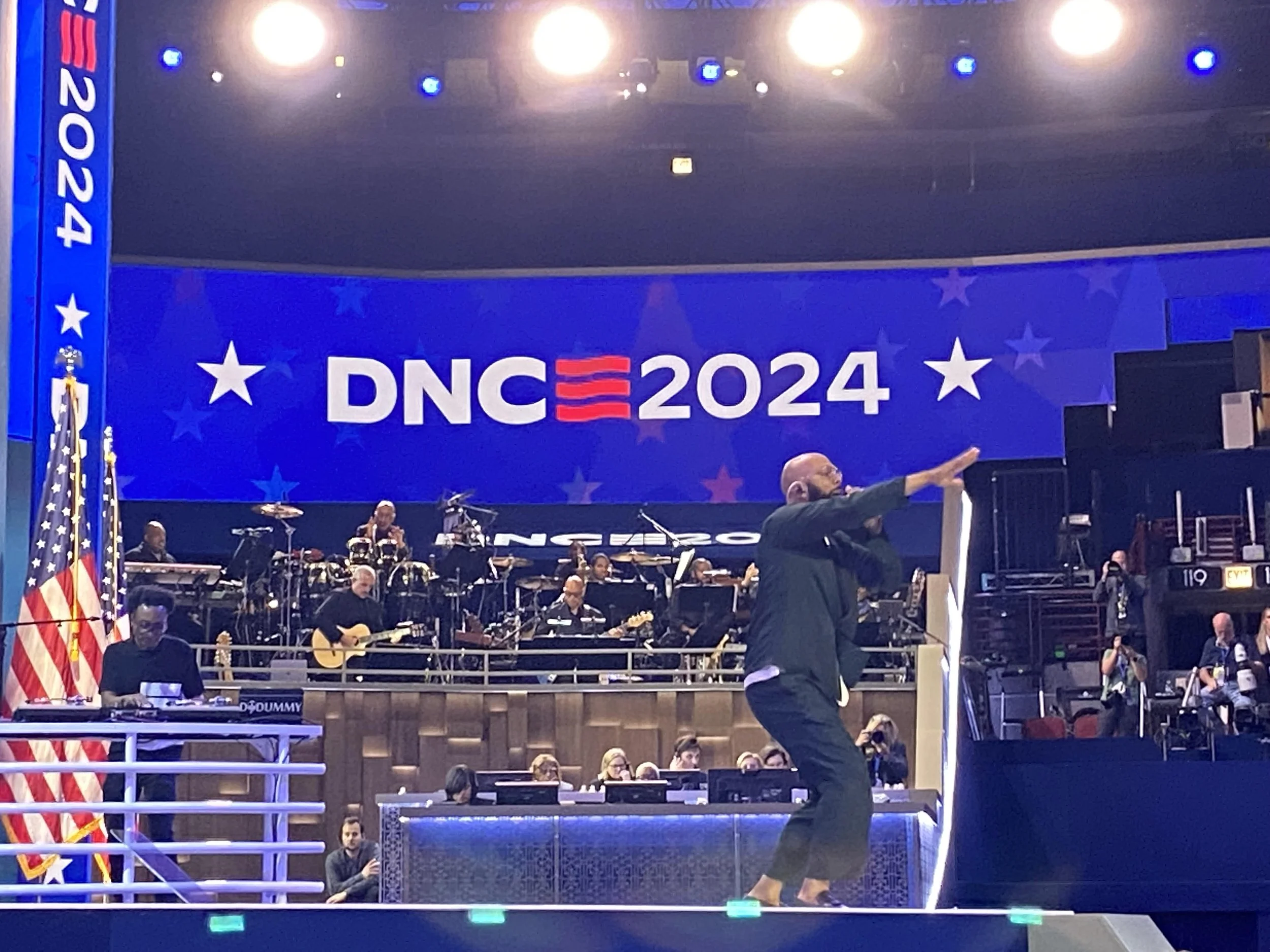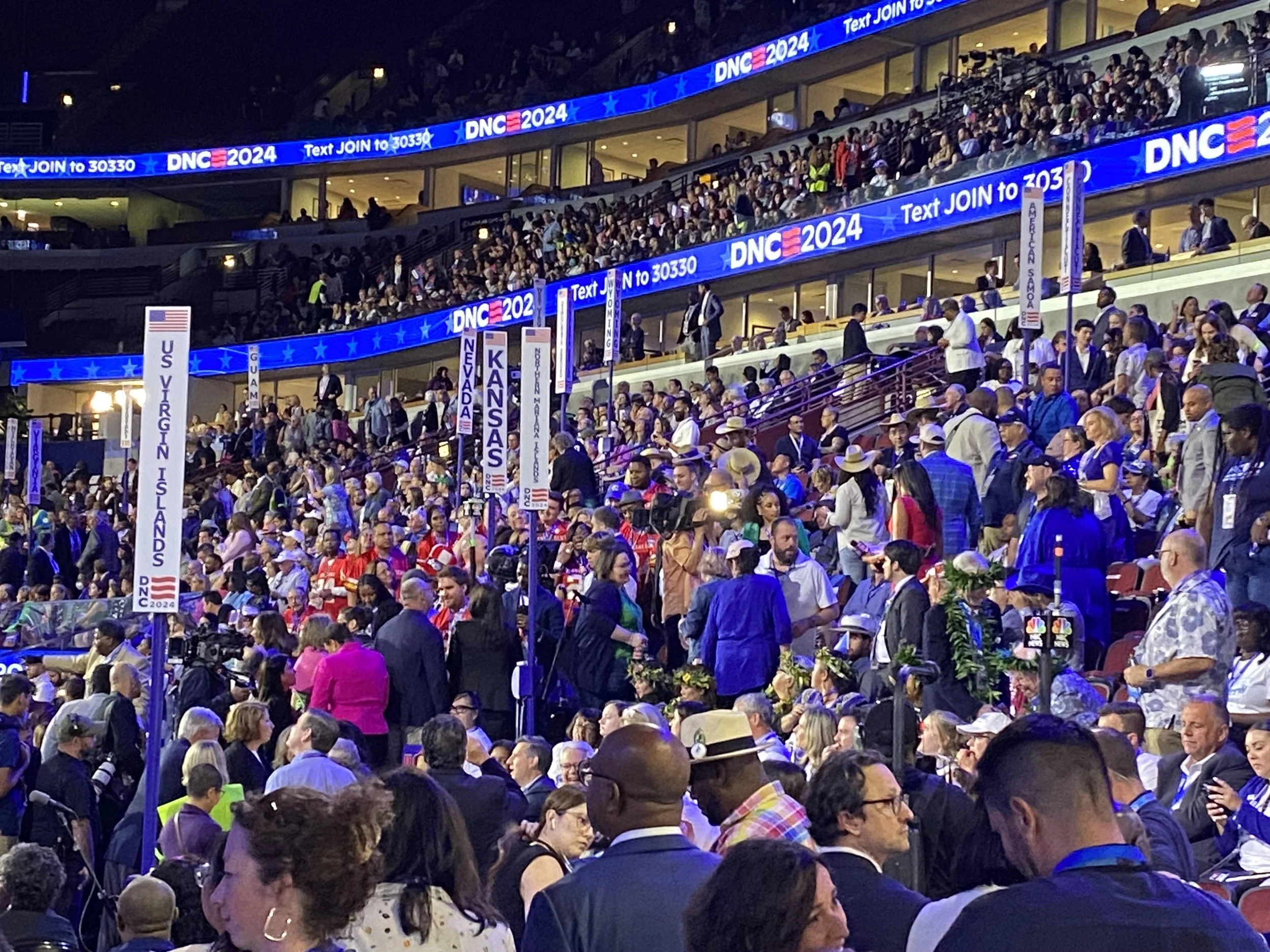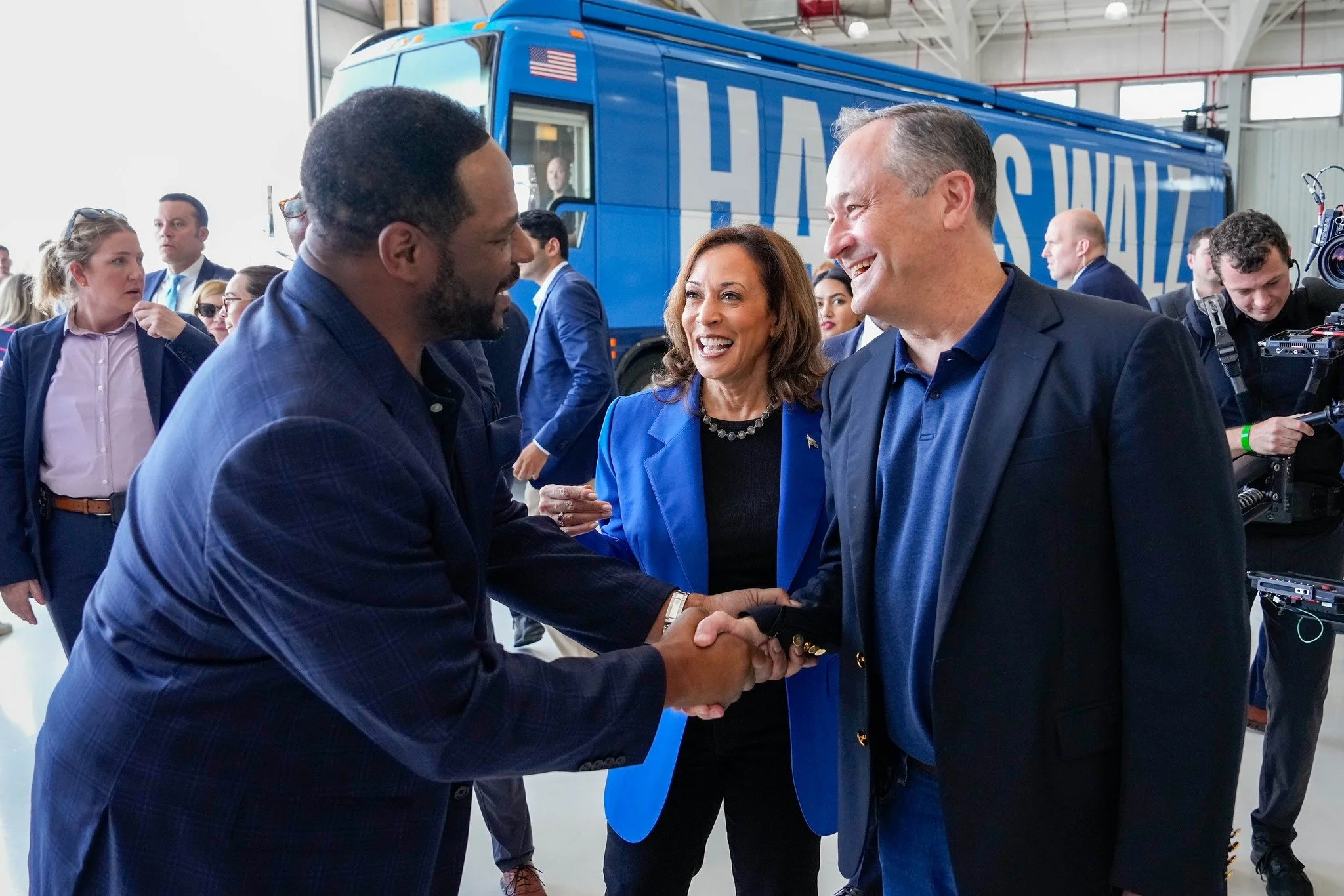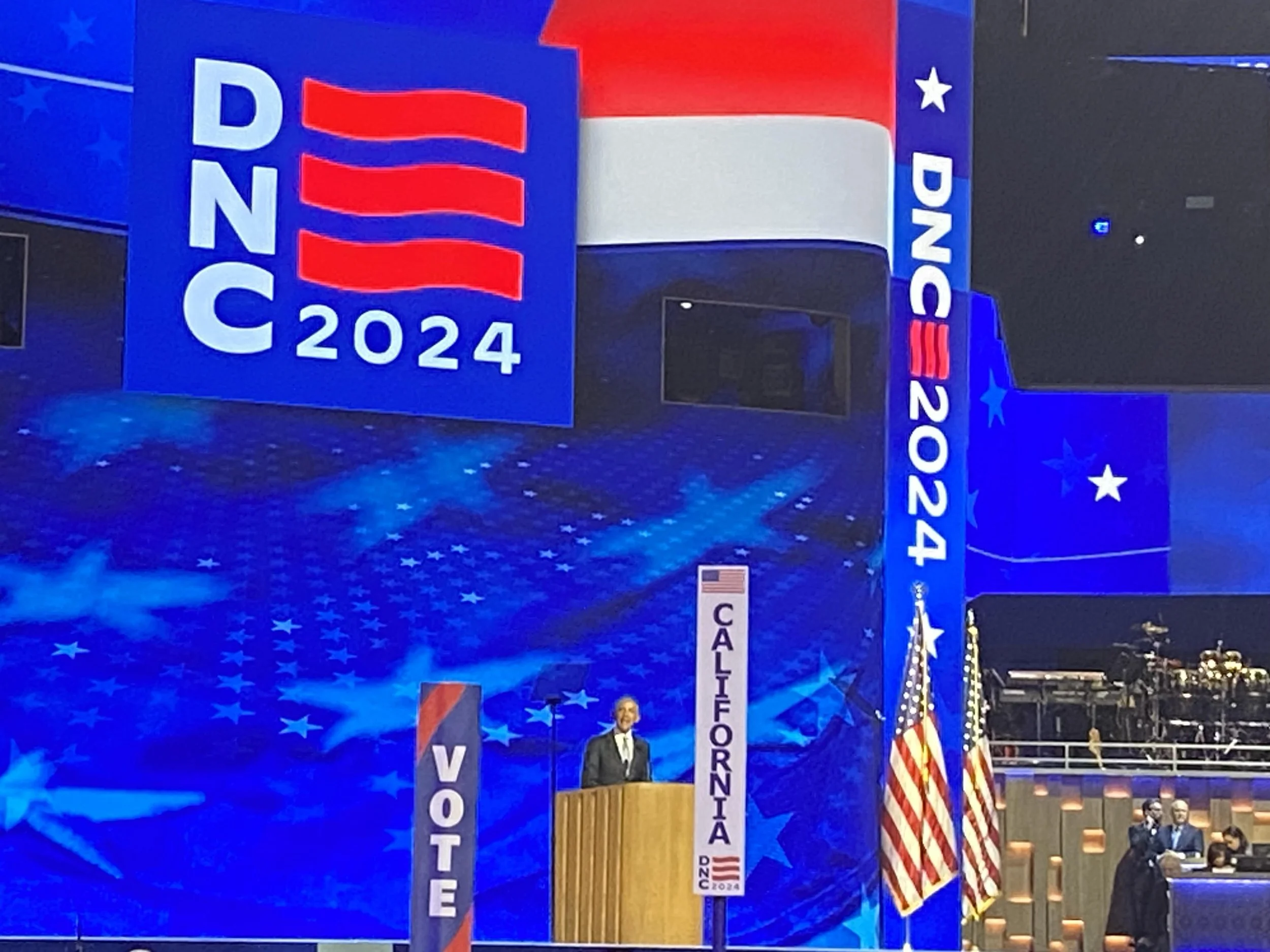Live from the DNC 2024: Analysis and Insights from Day Two By Luke Perry
Obamas’ night had a different vibe than Monday
Barack Obama selected Joe Biden as his running mate in 2008 in part because of his different political background and style. These differences were on full display Tuesday evening. The Obamas wanted to put their own mark on the evening, which was evident from the outset.
The incorporation of music was one prominent example. The crowd rose to its feet early in the evening when Patti LaBelle began singing in tribute to deceased party members. Common took the stage soon after and was greeted with equal enthusiasm. This was a notable contrast to Jason Isabell, who performed on Monday, and James Taylor, who was supposed to, but was cut due to time constraints.
Music was also central to the ceremonial roll call orchestrated by DJ Cassidy with a surprise performance by Lil John. This approach brought an upbeat and festive atmosphere to what historically can be a long, repetitive and mundane process. Unfortunately for media, including myself, convention organizers blocked floor access during this time.
Photo by Luke Perry
Democrats are clearly defining themselves as the party of freedom
Freedom and equality are two core values of American government dating back to the Declaration of Independence. They can work in concert with one another, for instance, when expanding voting rights to historically disenfranchised groups. Freedom and equality more often have a reciprocal relationship, where increasing one decreases the other, and vice versa.
In light of this tension, Republicans tend to prioritize expanding freedom more than equality. Democrats tend to prioritize expanding equality more than freedom. Spurred by the overturning of Roe v. Wade, this convention has displayed a concentrated effort by Democrats to flip the script and portray themselves as the party of freedom.
Early Tuesday evening emcee Mitch Landreau explicitly identified the themes of the evening and the focus of the Democratic Party. Freedom was number one. Landreau warned that Republicans are “coming for our books, our marriages, and our bodies.” Freedom has been featured in floor signs, digital imagery, prerecorded videos, and speech content.
Photo by Luke Perry
Republicans featured to help appeal to anti-Trump conservatives
Tuesday night included speeches by former Trump voters and administration officials. Stephanie Grisham, former White House press secretary for Donald Trump, provided an unvarnished and unflattering perspective of the former president.
Grisham described Trump as egotistical, unempathetic and immoral. She shared an apparent text requesting Melania Trump, whom Grisham also served as Chief of Staff, to persuade her husband to immediately denounce the violence of January 6, which was rebuked. Grisham claimed that as president Trump encouraged her to be dishonest and told her that if someone says something enough, people will believe you.
There are several former Trump administration officials who are not supporting him in 2024, most notably, former Vice President Mike Pence. This is unusual in presidential politics. Having one of these officials speak before the Democratic Convention was striking.
The challenge before Democrats is persuading disillusioned Republicans to vote for Kamala Harris rather than not voting at all. Joe Biden stepping down created a new opportunity with this voting block, most of whom do not think highly of him, and were less likely to vote for Biden again in 2024.
Photo from Vice President Harris
The headliners delivered
Doug Emhoff, Michelle Obama, and Barack Obama did not disappoint the audience in their primetime speeches to conclude the evening. Second Gentlemen Emhoff appeared remarkably comfortable in providing an affable and self-deprecating introduction to himself before a full arena and national audience.
Emhoff took the stage after a lull with lackluster enthusiasm for several speakers, such as former American Express Executive Ken Chenault and New Mexico Governor Lujan Grisham. Delegates were also notably disengaged for Bernie Sanders, suggesting his time as the top progressive spokesperson is fading.
The pre-recorded video narrated by Emhoff’s son, who introduced him, effectively primed the audience. The video included a close-up shot of Emhoff’s face as he jumped on stage to assist security stop a protester who charged Harris. This immediately endeared him to delegates.
Emhoff shared the dynamics of his courtship and marriage to Harris in a self-deprecating and humble fashion. For instance, Emhoff introduced his mother as the only one who in the world who thinks that Harris is the lucky one in their marriage. He shared the foibles of his first phone message to Harris following being setup on a blind date- a comedy of errors that Harris saved and makes him listen to every anniversary.
These personal anecdotes helped humanize the couple. Emhoff’s speech was occasionally sprinkled with a few light- hearted political nuggets, like when Emhoff said “You know that laugh. I love that laugh!” Mirroring the performance of the Harris campaign thus far, it would be hard to envision Emhoff’s speech going better.
Photo from Luke Perry
This is the Obamas’ house
There was no doubt who commanded the most attention and adoration of the convention hall: Michelle and Barack Obama. Ms. Obama began with a message of hope and change, reminiscent of President Obama’s 2008 campaign motto.
The Democratic presidential campaign, retooled with former Obama strategists, like David Plouffe, have framed Harris as the change candidate. On the surface, this would appear difficult, given Harris is the sitting Vice President. Relatively speaking, however, the campaign has effectively contrasted Harris to the two oldest presidents in history who were on track for widely panned rematch, while accentuating Harris’s age and vibrancy as someone on cusp of making history.
Ms. Obama spoke poetically and emotionally as the moral leader of the Democratic Party. Still grieving the death of her mother, Obama instructed the audience to not “squander the sacrifice our elders gave us to have a better future.” Obama displayed no patience for ego or anxiety among Democrats, stating that Harris is the most qualified candidate, so the job before them is helping her get elected, not fretting about gender perceptions or potential missteps moving forward.
Untethered from the role of First Lady, Obama criticized Donald Trump with particular moxie, citing his “limited and narrow view of the world” that “makes him feel threatened by the existence of two hardworking, highly educated, successful people who also happened to Black.” The crowd went wild after Obama asked: "Who’s going to tell him that the job he’s currently seeking might just be one of those 'Black jobs?'" (Trump previously criticized immigrants for taking “black jobs.”)
Photo by Luke Perry
The crowd next hung on every word from Barack Obama. Whereas Ms. Obama spoke in personal terms, President Obama spoke in broad political terms, citing the realities of the present and providing a vision for the future. His message was one of determination and reconciliation.
Democrats must do the work to elect Kamala Harris. Beyond this, President Obama discussed the social and systemic challenges facing the country, including division and disengagement. Obama provided a vision of reconciliation for the country, reminiscent of Abraham Lincoln’s Second Inaugural Address following the Civil War. He prescribed grace in facing people with jarring views, observing that all people encounter this from time to time in their own families and do not immediately dismiss their loved ones as completely bad people.
Obama was not only trying to not only seize the moment, which he appeared to do without missing a step, but also help precipitate a sustainable transition to the post-Trump era guided by his values, experiences, and pragmatic political nature
The Obamas’ stamp was on every facet of the evening, though their name was not found on any of the signs that filled the arena. They owned the building, not through calling Chicago home, but through their historic ascendancy to the White House and subsequent accomplishments lauded by Democrats, such as the Affordable Care Act. Even more, their character and leadership continue to re-orient the Democratic Party politics in a new direction, cementing them as preeminent figures for the foreseeable future.
Luke Perry is political correspondent for WCNY-TV and Distinguished Professor of Political Science at Utica University
Next Up: Analysis of the Last Two Nights of the Convention








